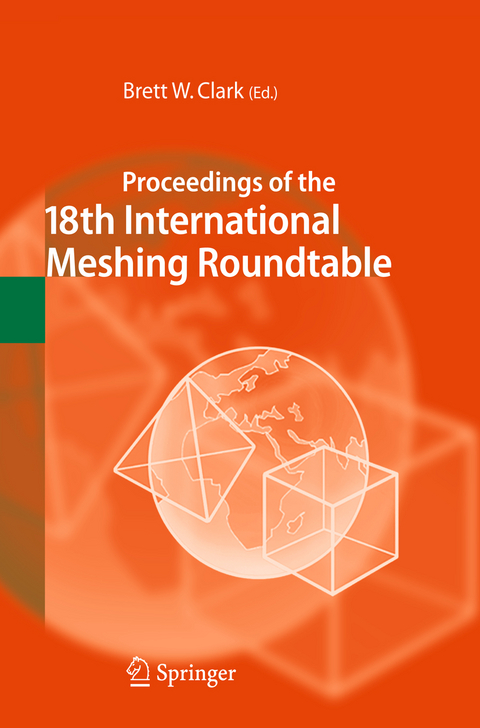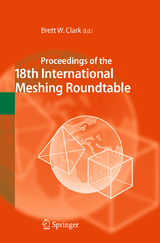Proceedings of the 18th International Meshing Roundtable
Springer Berlin (Verlag)
978-3-642-04318-5 (ISBN)
Session 1A: Surface Meshing.- Size Function Smoothing Using an Element Area Gradient.- Removing Self Intersections of a Triangular Mesh by Edge Swapping, Edge Hammering, and Face Lifting.- Conformal Refinement of Unstructured Quadrilateral Meshes.- Guaranteed-Quality All-Quadrilateral Mesh Generation with Feature Preservation.- Session 1B: Hexahedral Meshing.- Advances in Octree-Based All-Hexahedral Mesh Generation: Handling Sharp Features.- Conforming Hexahedral Mesh Generation via Geometric Capture Methods.- Efficient Hexahedral Mesh Generation for Complex Geometries Using an Improved Set of Refinement Templates.- Embedding Features in a Cartesian Grid.- Session 2A: Optimization.- Label-Invariant Mesh Quality Metrics.- Perturbing Slivers in 3D Delaunay Meshes.- Mesh Smoothing Algorithms for Complex Geometric Domains.- A Novel Method for Surface Mesh Smoothing: Applications in Biomedical Modeling.- Quality Improvement of Non-manifold Hexahedral Meshes for Critical Feature Determination of Microstructure Materials.- Session 2B: Geometry.- Automatic CAD Models Comparison and Re-meshing in the Context of Mechanical Design Optimization.- Distance Solutions for Medial Axis Transform.- Automatic Non-manifold Topology Recovery and Geometry Noise Removal.- A New Procedure to Compute Imprints in Multi-sweeping Algorithms.- Defeaturing CAD Models Using a Geometry-Based Size Field and Facet-Based Reduction Operators.- Session 3A: Parallel & Hybrid.- Towards Exascale Parallel Delaunay Mesh Generation.- On the Use of Space Filling Curves for Parallel Anisotropic Mesh Adaptation.- Mesh Insertion of Hybrid Meshes.- Tensor-Guided Hex-Dominant Mesh Generation with Targeted All-Hex Regions.- Session 3B: Applications.- Using Parameterization and Springs to Determine Aneurysm Wall Thickness.- Hybrid Mesh Generation for Reservoir Flow Simulation in CPG Grids.- VECTIS Mesher - A 3D Cartesian Approach Employing Marching Cubes.- Shape Operator Metric for Surface Normal Approximation.- Session 4: Tetrahedral Meshing.- The Meccano Method for Automatic Tetrahedral Mesh Generation of Complex Genus-Zero Solids.- Collars and Intestines: Practical Conforming Delaunay Refinement.- An Analysis of Shewchuk's Delaunay Refinement Algorithm.- Hexagonal Delaunay Triangulation.- Tetrahedral Mesh Improvement Using Multi-face Retriangulation.- Session 5: Adaptivity.- Automatic All Quadrilateral Mesh Adaption through Refinement and Coarsening.- Optimal 3D Highly Anisotropic Mesh Adaptation Based on the Continuous Mesh Framework.- Anisotropic Mesh Adaptation for Solution of Finite Element Problems Using Hierarchical Edge-Based Error Estimates.- On 3D Anisotropic Local Remeshing for Surface, Volume and Boundary Layers.- A Comparison of Gradient- and Hessian-Based Optimization Methods for Tetrahedral Mesh Quality Improvement.
| Erscheint lt. Verlag | 21.10.2009 |
|---|---|
| Zusatzinfo | XIV, 654 p. |
| Verlagsort | Berlin |
| Sprache | englisch |
| Maße | 155 x 235 mm |
| Gewicht | 2450 g |
| Themenwelt | Informatik ► Theorie / Studium ► Künstliche Intelligenz / Robotik |
| Technik | |
| Schlagworte | 3D • 3D graphics • adaptive finite elements • algorithm • algorithms • Analysis • Computational Geometry • Computer Graphics • Hardcover, Softcover / Technik/Allgemeines, Lexika • Mesh Generation • Meshing • Modeling • Numerical analysis • Operator • Optimization • Simulation • Topology • Triangulation |
| ISBN-10 | 3-642-04318-6 / 3642043186 |
| ISBN-13 | 978-3-642-04318-5 / 9783642043185 |
| Zustand | Neuware |
| Informationen gemäß Produktsicherheitsverordnung (GPSR) | |
| Haben Sie eine Frage zum Produkt? |
aus dem Bereich




